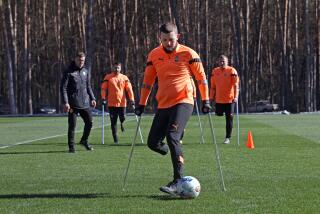Soccer player embodies one Afghanistan success story: sports
- Share via
Reporting from Kabul, Afghanistan — As far back as he can remember, soccer has been part of Shafaq Ayobi’s life.
As a 7-year-old shepherd in eastern Afghanistan’s Laghman province, he kicked around a ball that he and his friends formed from scraps of cloth. Each day, as he made the seven-mile journey from home to the grazing area for his family’s livestock, he carried the ersatz ball.
“While the animals would graze and drink water,” he said, “I would play.”
The middle child of 11 siblings, Ayobi said it was his three older brothers, who played on local soccer teams, who inspired him.
“I always thought to myself, one day I will play like them.”
Ayobi was 8 when his family fled growing insecurity in Laghman for the eastern city of Jalalabad. After playing in a high school match and scoring goal after goal, Ayobi was taken under the wing of one of his brothers.
Now 23, Ayobi has surpassed his brothers, becoming a star forward in the Roshan Afghan Premier League, a national soccer league launched in 2012 that has become increasingly popular.
Ayobi plays for De Spinghar Bazan, representing Nangarhar province, the focus of some of the heaviest fighting in Afghanistan in recent years. Since joining the team two years ago, Ayobi has earned an avid following in Kabul, Jalalabad and his home province.
Though few people in Laghman have access to television, fans there often tell Ayobi they never miss a match.
“These people, many of whom are so poor, follow each of my matches on the radio,” he said. “I can’t tell you how much that means to me.”
Last month, his underdog team won the league crown, defeating the two-time championship squad from Kabul, the Afghan capital. When Ayobi and his teammates traveled to Nangarhar province, they were greeted by thousands of fans.
Ayobi’s success is a symbol of how far the eight-team Premier League, and athletics in general, have come in a country facing a long insurgency and economic instability.
Afghans often point to sporting triumphs as among the nation’s few frequently positive stories. In 2008, Afghanistan won its first Olympic medal when Rohullah Nikpah secured a bronze medal in taekwondo in Beijing. He repeated the feat at the 2012 Summer Games in London.
In 2013, Afghanistan won its first international sporting trophy, defeating India, 2-0, for the South Asia Football Federation Championship.
Afghans have also shown an aptitude for cricket, a relatively new sport here. This year, the national team beat Scotland to win its first World Cup match.
Women, largely banned from work and school during the hard-line Taliban’s six-year rule, have also advanced in athletics.
In September, the nation’s second women’s soccer league tournament drew a crowd that included representatives from the office of First Lady Rula Ghani and the British ambassador to Afghanistan.
In the central province of Bamian, where women rarely drive cars or ride bikes, a group of young women has started a successful bicycling team.
For Ayobi, his own success in soccer shows how far Afghans can advance through sports.
“In Laghman we couldn’t afford rice and meat,” he said. “All we had to eat was onions and bread.”
There are reminders of poverty among fans as well. While thousands fill the seats — tickets cost about $1.50 — others who can’t afford the price stand by the fence to listen to the game, broadcast on speakers inside. Others watch from atop nearby buildings, and some impoverished youngsters beg for tickets outside the stadium.
At a match in Jalalabad this spring in which he scored a goal, Ayobi was thrilled to see his father in the stands. His mother, who passed away earlier in the year, used to pray during his matches, he said.
Organizers of the Afghan Premier League say the sport has attracted a strong following at a time when thousands line up outside passport offices and embassies to find a way to leave the country.
Still, they say, much work remains to be done. The Kabul stadium that hosts nearly all the league’s matches doesn’t have lights, so play usually begins at 3 p.m., in the middle of rush hour.
This year, the Japanese government expressed interest in installing lights at the stadium.
“If we can get that, it would transform the game,” said Nasir Ahmadzai, the league’s Afghan American deputy commissioner.
With success stories like Ayobi’s, Ahmadzai said, the league will press on.
“I hope to make my father even more proud by realizing my dream of joining the national team one day,” Ayobi said.
Latifi is a special correspondent.
ALSO
L.A. leaders warn Angelenos to prepare for ‘Godzilla’ El Niño storms
China, Taiwan presidents meet with historic handshake
Why huge ‘SNL’ ratings won’t help Donald Trump become president
More to Read
Sign up for Essential California
The most important California stories and recommendations in your inbox every morning.
You may occasionally receive promotional content from the Los Angeles Times.










